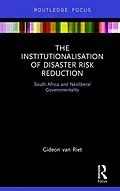The past three decades have seen a global shift in disaster management from an event driven response to a 'could-be' risk management approach. Disaster Risk Reduction (DRR) has become entrenched as a dominant paradigm within the field of disaster management. More than a decade after adopting DRR legislation in South Africa there remains a dearth of evidence that this has translated into substantive action. This book examines the institutionalisation of DRM in South Africa. Using a Critical Theory approach, the book does not consider why DRR is failing but instead asks 'why DRR?' It explores possibilities beyond DRR's narrow optic and offers new insights into disaster management.
Autorentext
Gideon van Riet is Senior Lecturer in Political Studies at North-West University's Potchefstroom Campus in South Africa.
Inhalt
Introduction 1. A genealogy of disaster risk assessment and management 2. South Africa's disaster risk profile 3. Writing structural violence: conceptualising ordinary South African being 4. Modes of institutionalisation 5. Knowledge production 6. Multiple dystopias Conclusion: (un)framing risk as a techno-political instrument
